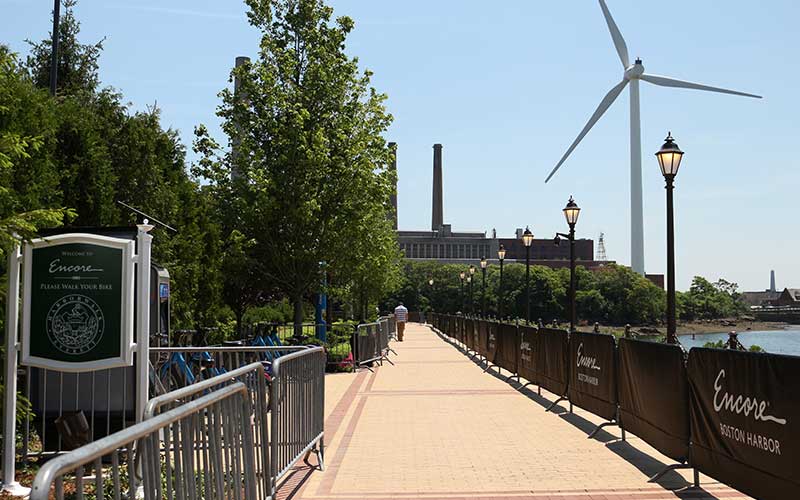
Encore Resorts built a walkway to provide public access to the Mystic River waterfront. Other corporate and industrial actors, especially those located in lower-income communities, have denied the public their legal right to access waterfront areas along their properties.
COVID19 has exposed inequities in our society in many ways – one of which is the right to access the natural amenities that belong to all Massachusetts residents. Nowhere is this more evident than in the Greater Boston area, where many communities of color do not have equal access to open space and parks, especially along their waterfronts.
Not coincidentally, these communities also suffer from higher rates of poverty, greater exposure to dangerous pollutants, lack of access to quality healthcare, and less influence in the corridors of political power. These dynamics – as well as the fact that workers in these communities have fewer options to work from home if they want to keep their jobs – have all contributed to higher rates of COVID-19 infections and deaths among the region’s Black and Latinx populations.
It has become clear during this crisis that communities like Chelsea, Revere, Everett, East Boston, and Dorchester need not only better access to health care, but to open space and recreation areas as well. Having parks and other green spaces within easy walking distance equals better physical and mental health – which is more important now than ever.
The Massachusetts Public Waterfront Act enshrines the people’s right to access our waterfront areas into law, yet too often, those rights are ignored. It’s time for this neglect to end.
Access to Open Space Shouldn’t Depend on Your Zip Code
A walk along Boston’s Seaport District offers sweeping water views, manicured lawns, and even a public green, all framed by the tall, glassy office and residential buildings. Contrast that with a drive along the Mystic River through Chelsea. The few tiny parks near the river are surrounded by massive industrial facilities – from the ExxonMobil oil terminal to a towering hill of road salt to a looming power plant.
Yet waterfront areas in both the Seaport and Chelsea are governed by the same law: the Massachusetts Public Waterfront Act, which not only guarantees the public’s right to access these areas but also sets conditions for how developers can build on them. That Chelsea and other neighborhoods in Boston have not benefited from the Public Waterfront Act in the same way as wealthier and whiter neighborhoods is usually the result of industrial and corporate neglect.
National Grid Shows How Not to Be a Good Corporate Neighbor
Perhaps the most egregious example of this neglect today can be seen along a half-mile stretch of the Malden River. The Massachusetts Department of Environmental Protection has ordered the property’s owner, National Grid, to construct a 10-foot-wide pathway along the riverbank. National Grid has not only refused but is appealing the order to the State.
Other waterfront property owners have stepped up to do the right thing in recent years, including Encore Resorts and DDR’s Gateway Center. But National Grid refuses, despite efforts by elected and community leaders as well as activists from the Mystic River Watershed Association and the Friends of the Malden River. The communities impacted by National Grid’s illegal actions – Medford, Everett, and Malden – are among the Commonwealth’s most diverse. They also face some of the highest rates of COVID-19 infections.
This example is hardly unique. Other communities, such as Revere, Chelsea, and Lynn, are also fighting for public access and open space that is rightfully owed to them under the law.
No One Should Have to Fight for Equitable Access to Open Space
Communities of color and those with low incomes deserve to enjoy open spaces along Boston’s waterfront for recreation and exercise – it’s also their right by law. Yet, through neglect and outright refusal by corporate interests, too many do not have the chance to run, walk, or even stretch near the water.
We can and must do better.